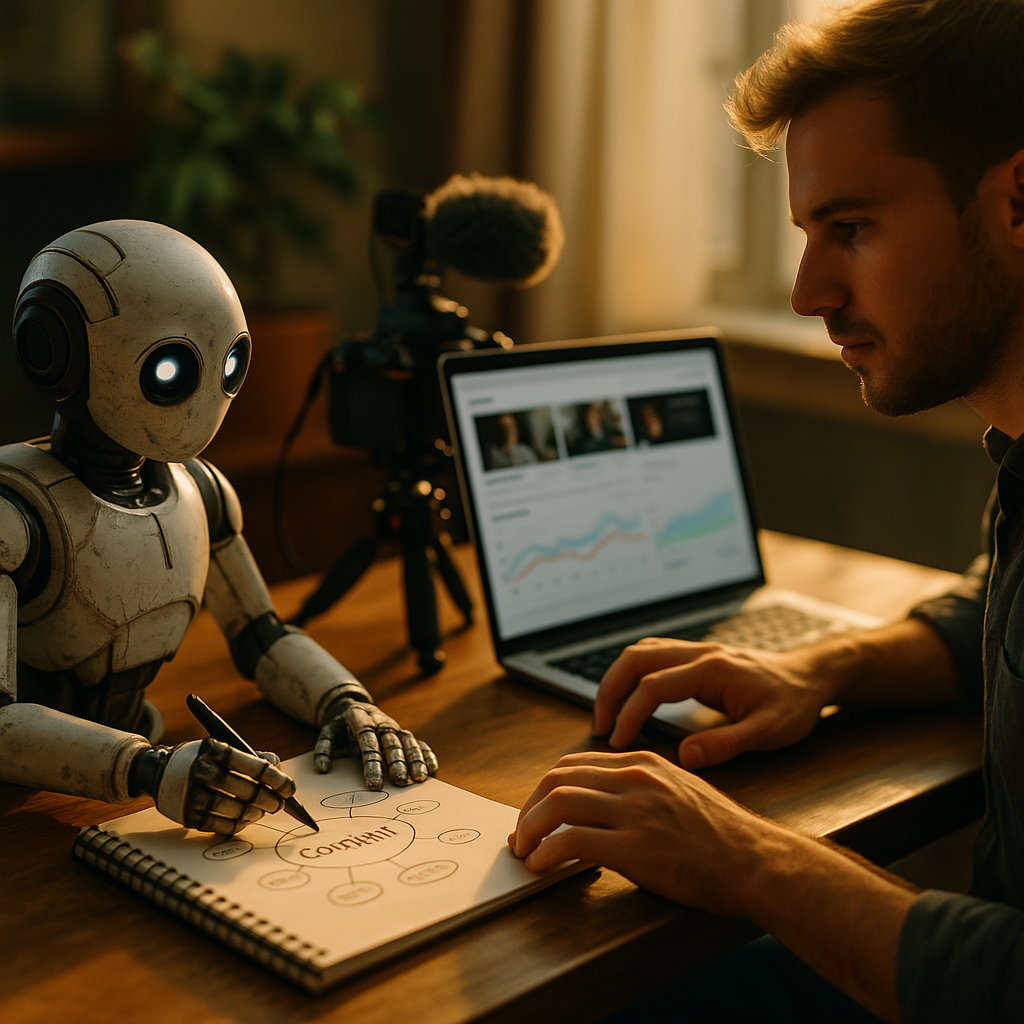The primary keyword “AI-managed creator” captures a seismic shift in the digital content world. Content strategies, once crafted by humans, are now directed by complex algorithms. This transformation isn’t science fiction—it’s revolutionizing how creators work today. Why are influencers, brands, and even solo creators increasingly handing the keys to artificial intelligence? Let’s explore why everyone’s talking about this new creative paradigm.
Understanding the AI-Managed Creator Revolution
The term “AI-managed creator” refers to modern content creators whose workflow, strategy, and even creative output are orchestrated by advanced algorithms. With the proliferation of generative AI tools, content ideation, timing, optimization, and multichannel publishing are increasingly handled by artificial intelligence. This revolution allows creators—from influencers to corporate social teams—to scale personalized content faster and more efficiently than ever before.
By 2025, over 70% of top-performing social media accounts are using AI-driven content schedulers and recommendation engines to boost engagement (Source: Sprout Social Trends 2025). These systems analyze user data, track platform trends, and adjust in real time, ensuring every post lands with maximum impact. The result? A new breed of digital influencer who’s part human, part algorithm.
The Algorithms Behind Modern Content Strategy
What does it mean to “run the content strategy” through algorithms? AI-managed creators leverage sophisticated tools capable of:
- Trend detection and topic prediction far ahead of traditional research methods
- Dynamically adjusting editorial calendars using engagement analytics
- Personalizing content formats and timing for every target audience segment
- Optimizing keywords, visuals, and hashtags with a precision that outpaces human intuition
Rather than manually researching, creators now set campaign goals, then allow AI to A/B test variants, monitor results, and iterate faster than any human team could. This reduces guesswork and enables constant, incremental improvements—vital for maintaining relevance as platforms evolve. For brands, this means consistent messaging and sustained connection with diverse, global audiences.
Benefits and Challenges of Becoming an AI-Managed Creator
Adopting an AI-powered approach carries unmistakable advantages. AI-managed creators can:
- Scale content output without exponentially increasing headcount
- Respond to audience feedback instantly with real-time analytics
- Access actionable insights to optimize performance continuously
- Reduce burnout by automating repetitive tasks
However, challenges remain. Algorithm-driven creation occasionally risks diluting a brand’s unique voice or introducing bias based on flawed data sets. Plagiarism and copyright issues may arise if AI regenerates popular formats too closely. Ethical considerations—like transparency around AI usage—are already influencing social media policies in 2025. Critical to success is a balanced approach: creators must blend human authenticity with algorithmic efficiency.
Human Creativity vs. Algorithmic Optimization in Content Creation
The rise of AI-managed creators is not about replacing human ingenuity. Instead, it amplifies what creators do best: storytelling and personal connection. AI handles the repetitive, data-driven elements of publishing, freeing up time for:
- Conceptual, high-level thinking and brand development
- Narrative crafting, humor, and emotional nuance
- Engaging directly with audiences through live interactions
- Reviewing AI-generated scripts and visuals for personal touch
This collaboration, often called “centaur creativity,” sustains authenticity while benefiting from AI’s speed and scale. Expert content creators in 2025 treat AI tools as creative partners, not competitors—directing algorithms with clear intent, values, and guidelines.
How Brands and Independent Influencers Are Harnessing AI in 2025
Brands and independent influencers are at the forefront of AI-driven content evolution. Large-scale brands use AI-managed creator tools to harmonize messaging across multiple markets and languages, analyzing millions of data points to fine-tune campaigns on a global scale. Micro-influencers, once unable to compete with big budgets, now use affordable AI assistants for:
- Deep audience segmentation and personalized outreach
- Content recycling and optimization across platforms like TikTok, Threads, and YouTube
- Real-time trend monitoring, allowing them to tap into viral moments as they emerge
According to a 2025 Creator Economy Report, 83% of full-time content professionals attribute growth in reach and revenue to adopting AI-managed tools. The result is a democratization of influence, where smart automation empowers creators of all sizes to thrive.
The Future of the AI-Managed Creator Model
Looking ahead, the AI-managed creator model signals a permanent change in content production. Regulatory frameworks are catching up, requiring creators to disclose algorithmic assistance to avoid “deepfake” misinformation and preserve trust. Meanwhile, AI is evolving to understand emotional tone, cultural context, and even the subtle cues that drive virality.
Embracing this model means adopting best practices for ethical AI use, investing in ongoing education, and maintaining a proactive editorial presence. Content professionals excelling in 2025 blend data intelligence with creativity—proving that human vision and AI’s organizing power are most effective together.
Frequently Asked Questions About AI-Managed Creators
-
What is an AI-managed creator?
An AI-managed creator uses artificial intelligence to autonomously plan, create, and distribute content, leveraging algorithmic decision-making for maximum engagement and efficiency.
-
Can AI really generate unique content?
Yes, modern generative AI models can create unique articles, images, and videos based on data inputs. However, human oversight is crucial to maintain originality, relevance, and brand voice.
-
What are the main risks of relying on algorithmic content management?
AI-managed strategies may introduce bias, dilute originality, or unintentionally infringe on copyrights if not carefully supervised. Transparency and regular audits help mitigate these risks.
-
How do I start using AI to manage my content strategy?
Begin by identifying platforms offering AI content management and publishing tools. Gradually integrate them into your workflow, always reviewing results and retaining a human creative touch.
-
Is content produced by AI-marked as such on social media in 2025?
Most major platforms require creators to disclose significant AI involvement to maintain transparency and audience trust. Exact requirements may vary by jurisdiction and platform.
The rise of the AI-managed creator is not just a trend—it’s the future of digital content creation. By harnessing algorithmic efficiency while maintaining human creativity, brands and influencers can engage audiences with greater impact than ever before. The best results emerge from thoughtful collaboration between creator and machine.
